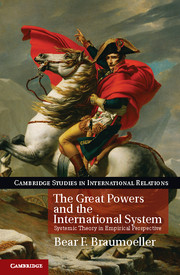Book contents
1 - Introduction
Published online by Cambridge University Press: 05 January 2013
Summary
In Thucydides' History of the Peloponnesian War, the author recounts an incident in which the Athenians sailed to the island of Melos, a Spartan colony, and two Athenian Generals, Cleomedes and Tisias, sent their representatives to negotiate with the Council of the Melians. What makes their dialogue especially noteworthy is the Athenians' bald statement at the onset that, in their negotiations, the Melians should not appeal to the Athenians' sense of justice, because, quite simply, “the strong do what they can and the weak suffer what they must.” The sphere of power is independent of the sphere of justice, rendering the state an autonomous actor, able to pursue its own interests, limited only by its own capabilities. Millennia later, in an era in which Great Powers have given way to superpowers and nuclear weapons have magnified the disparity between strong and weak to a degree unimaginable to the Athenians, the aphorism remains familiar and seems more applicable than ever.
It is surprising, therefore, to find some of the most adroit statesmen at the helm of some of the most powerful states of the past two centuries expressing near helplessness in the face of the impersonal forces that shape world politics. No less effective a diplomat than Charles de Talleyrand-Périgord famously said that “[t]he art of statesmanship is to foresee the inevitable and to expedite its occurrence.” Otto von Bismarck, architect of German unification, wrote that “[e]ven victorious wars can only be justified when they are forced upon a nation.”
- Type
- Chapter
- Information
- The Great Powers and the International SystemSystemic Theory in Empirical Perspective, pp. 1 - 22Publisher: Cambridge University PressPrint publication year: 2013

